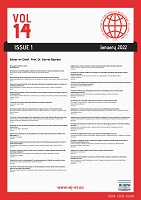Development of social skills of high school students on virtual platforms, 2021
Development of social skills of high school students on virtual platforms, 2021
Author(s): Fernando Eli Ledesma Pérez, Juana María Cruz Montero, Lindon Vela Meléndez, Enaidy Reynosa NavarroSubject(s): Theory of Communication, Higher Education , Educational Psychology, ICT Information and Communications Technologies, Distance learning / e-learning
Published by: Birlesik Dunya Yenilik Arastirma ve Yayincilik Merkezi
Keywords: Social Skills; Emotional Support; Affective Relationships; TIC;
Summary/Abstract: The objective of this study is the development of social skills of high school students in virtual settings. Methodology: Qualitative, phenomenological, hermeneutical study, developed in three stages. In the descriptive stage, planning activities and ethical procedures were socialized; In the structural setting, intervention protocols, contingency plans, methodological memory, approach to participants, and delimitation of roles were foreseen both within and outside the field of study. In the discussion stage, the results were contrasted with recent studies, arriving at definitive conclusions. The technique used was the semi-structured interview, and as an instrument, a guide of questions derived from the subcategories of the study was used. The participants were five students of the sixth cycle of Regular Basic Education (first and the second year of secondary education) with ages of 13 and 14 years, three men and two women volunteers, a teacher (director), and two teachers (without management positions). Experts validated the interview. Results: Reciprocal help in the affective sphere motivates the encounters in virtual settings in the participants. Virtual scenarios mediate effective relationships in a significant way. Conclusions: Reciprocity is a priority element that generates trust and allows participants to understand the needs of their colleagues, virtual spaces serve as emotional support for all their members, and as they all connect with the active cameras, scenarios very similar to those are generated.
Journal: World Journal on Educational Technology: Current Issues
- Issue Year: 14/2022
- Issue No: 1
- Page Range: 231-242
- Page Count: 12
- Language: English

